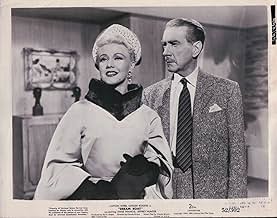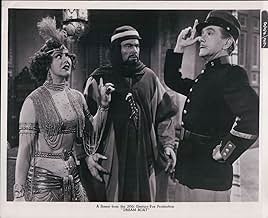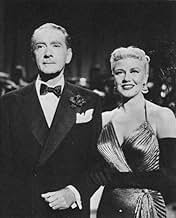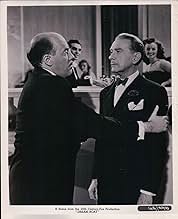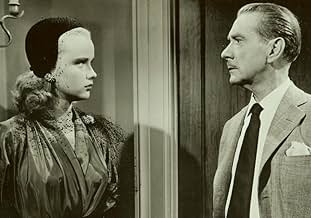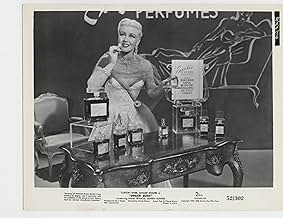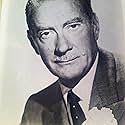Ajouter une intrigue dans votre langueRespected college professor Thornton Sayre is plagued when his old movies are shown on TV, and sets out with his daughter to stop it. However, his former co-star is the hostess of the TV sho... Tout lireRespected college professor Thornton Sayre is plagued when his old movies are shown on TV, and sets out with his daughter to stop it. However, his former co-star is the hostess of the TV show playing his films, and she has other plans.Respected college professor Thornton Sayre is plagued when his old movies are shown on TV, and sets out with his daughter to stop it. However, his former co-star is the hostess of the TV show playing his films, and she has other plans.
- Réalisation
- Scénario
- Casting principal
- Tavern Patron
- (non crédité)
- Desk Clerk
- (non crédité)
- Student
- (non crédité)
- Hotel Clerk
- (non crédité)
- Commandant in Silent Movie
- (non crédité)
- Restaurant Patron
- (non crédité)
- Man in Lobby
- (non crédité)
- Gloria's Backup Singer
- (non crédité)
Avis à la une
Was flipping through the TV channels and settled on AMC, a channel that no longer runs black and white social comedies from the 30's through '50s.
I was delighted and surprised to find this Clifton Webb jewel. As a mother of two younger children (one ten months) it is difficult to find movies and TV shows that entertain both children and adults. This one fit the bill.
Ginger Rogers is incredibly well cast as the woman who is all for business and Webb is quite the comic.
Credit the quality to writer-director Binyon who sometimes showed flashes of brilliance in what appears an otherwise checkered career. And here I thought Frank Tashlin was the first moviemaker to mine TV's rich lode of absurdity. I love it when the professor turns channels randomly in the courtroom, and each channel is programming something ridiculous, including his old movies. It's hilarious. It's also hard to know how much things have changed since then, especially with the commercials.
The rest of the storyline is entertaining but nothing special. I enjoyed seeing a very young Ann Francis who makes a surprisingly good nubile academic. Too bad, however, there's not more of the delicious Elsa Lanchester. Her amorous moves on Webb amount to one of ditzy pairings of the decade. Then there's that clever tie-in at the end, helping make this 90-minutes of obscure, unexpected delight. Too bad the movie wasn't served by a more appropriate title.
This is a deftly amusing film in which Hollywood is poking fun at the silliness of its arch-rival of the 1950s, TV. It also pokes fun at its own early days of silent melodrama.
The film is an enjoyable experience overall, but especially delicious is Webb as the prim professor who is also the soap-opera film star of old Hollywood.
What a treat this is. One of those movies you never hear about but is just great fun. Clifton Webb is terrific, throwing out one pithy line after another. I'm kind of surprised Ginger did this part, given that it dates her in a way most actresses of the time wouldn't want any part of. Actually, it makes her seem older than her real age. Props to her for not caring. You sure as heck wouldn't have caught Joan Crawford admitting to being 40 -- even when she was 60! She looks amazing, though, and is very funny. It's one of her best post-1940s comedic roles. Anne Francis is cute as a button and holds her own quite well. Supporting cast includes a wonderful Elsa Lanchester and an early role for Jeffrey Hunter. The fake silent movies are hilarious. It's especially funny seeing Webb channel Douglas Fairbanks in one of his action scenes. It's an underrated gem of a comedy that provides some smart commentary on celebrity and satire on television ("The phenomenon of television -- it encourages people who dwell under the same roof to ignore each other completely"). Definitely a movie you should check out if you get the chance, especially if you're a fan of Clifton Webb or Ginger Rogers.
It is not until Templeton that the studio revises it's views on the talented Mr. Webb. Up till that time, Webb was seen as a sophisticated (perhaps effeminate) villain - and had played the part well twice. Templeton is villainous only in one area - he sees no future for his niece Isabel (Gene Tierney) with Larry Darrell (Tyrone Power), so when Isabel breaks with the latter Elliott encourages her to do so (using her future large inheritance from him as a lure). He also suggests she marry Gray (John Payne), a safer, more reliable husband (and a stockbroker). This may seem villainous (if you like Power's character), but he accepts it readily enough. Isabel actually is more villainous as the story progresses, getting rid of a weakened rival with truly fatal results. But Elliott just becomes a selfish, self-indulgent joke as the film progresses. In the end we welcome him for being funny (in an unintentional way). After Elliott Templeton it occurred to 20th Century Fox (and later other studios) that Webb could be a comedian - and a sharp one.
They should have realized this to begin with. Webb, in his youthful heyday of first Broadway stardom (1920 - 1940) was a leading musical comedy star. Most people seeing him today as Mr. Belvedere or as John Philip Sousa (ironically, his only musical film part), or as the doomed Richard Sturgis in TITANIC can't think of him as one of the best singer comedians in Broadway history - at one point the leading rival to Fred Astaire! His decision to make STARS AND STRIPES FOREVER in 1953 destroyed the one opportunity he would have had to strut his musical comedy talents on celluloid. Vincent Minelli hoped he'd play Geoffrey Cordova, the "Renaissance Man of the Theatre" in THE BAND WAGON. He would have played with Astaire. Instead the film has British musical comedy star Jack Buchanan in the role.
What he might have been like as a silent film comic actor (or even dramatic actor) is hard to say. He only has one surviving modern film which tackles this issue. In 1952 he played Bruce Blair, once the partner with Gloria Marlowe (Ginger Rogers) in a series of silent romantic dramas. Their partnership is like that of Ronald Colman and Vilma Banky, who made about five films together in the late 1920s. Blair left movies at the end of the silent period - tired of the grind, and wanting to teach literature at college (where the superior Webb would gravitate too naturally). He is using his real name, Thornton Sayre, as his professorial name. He is there with his daughter, and a seemingly quiet academic life. Then all hell breaks lose - Gloria has been hired to be the hostess of a television series showing their old popular movies. And they are a hit. But they have made his students, fellow academe, and the head of the college (a hopelessly adoring Elsa Lanchester) recognize Sayre for whom he actually was.
The plot has Webb trying to bring legal action to prevent the showing of the films (particularly as ridiculous sound effects and rewritten message cards advertising products are making him look idiotic). Gloria backed by her agent/producer (Fred Clark) fight this, and Gloria - in trying to vamp Bruce - remembers how she did like him years ago but lost him to another woman. All of which leads to a final courtroom showdown.
The whole film is funny, but the best bits were Webb overacting (in the silent film method) in the silent films he made, such as a World War I aviation epic, which ends with a crash (but he's still able to kiss his beloved Rogers in his trademark triple arm kiss - they are in a clinch at the fade out of the silent film). There is also a priceless scene where an angry drunk in a bar starts a fight with Webb for accidentally turning on his wife. Webb, no physical pushover here, watches the physical wrestling throws of twenty five years earlier on the television screen, and repeats them on the drunk!
The problems with misused silent films bugged many retired film figures in the early days of television. Stan Laurel was angry at the butchering of his comedies for commercials (it ruined well planned timing for gags). So the film actually does show a situation that existed in early television. It also partly answers the question of what Webb would have been like in an earlier age of movies.
Le saviez-vous
- AnecdotesThe scenes at the end which are supposedly from Bruce Blair's "new" movie are actually scenes from Bonne à tout faire (1948), the first of Clifton Webb's Mr. Belvedere trilogy. The theater marquee correctly identifies the film as "Sitting Pretty", blurring the line between real-life actor Clifton Webb and his actor character Bruce Blair in this film.
- GaffesWhen Miss Marlowe's cab arrives at her "real" hotel after she leaves the flophouse, the headlights are off (probably to reduce glare), but when the angle changes the lights are back on.
- Citations
Gloria Marlowe: You ungrateful, untalented hypocrite.
- ConnexionsFeatures Bonne à tout faire (1948)
- Bandes originalesYou'll Never Know
(uncredited)
Music by Harry Warren
Lyrics by Mack Gordon
Performed by Ginger Rogers and others at the nightclub
Meilleurs choix
- How long is Dreamboat?Alimenté par Alexa
Détails
- Durée1 heure 23 minutes
- Couleur
- Rapport de forme
- 1.37 : 1
Contribuer à cette page



